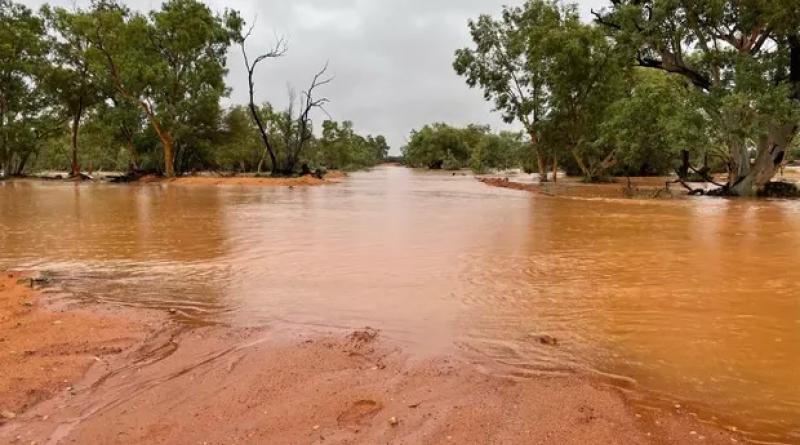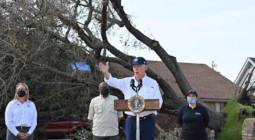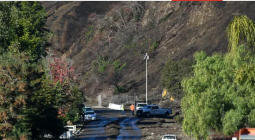Flooding cuts off key railway supply routes in central Australia

The disruptions have sparked calls for greater strategic planning for major freight corridors in the face of climate change
Supply chains already stretched due to Covid-related staff shortages have been severed after floods in South Australia washed away parts of the railway linking the eastern states with Western Australia and the Northern Territory.
Parts of the Australian Rail Track Corporation network between Adelaide and Tarcoola in SA have temporarily ceased operation, as repair works are under way along a section of track over 300km in length.
The operations to Perth and Darwin have been suspended since 21 January with the ARTC expecting the tracks to remain closed for “at least 12 days”.
The disruption has sparked calls for greater strategic planning for key transport and logistics routes as climate disasters are projected to continue.
The chief executive of Australia’s largest private rail freight company Pacific National, Paul Scurrah, described the Trans-Australian Railway as “the umbilical cord connecting our continent’s eastern and western seaboards – it’s a vital link in Australia’s supply chain”.
Scurrah said while short term solutions are important, in the long term the rail network needs to be more resilient.
The chief executive of Western Roads Federation, Cam Dumesny, said that 80% of WA’s land-based freight arrives via rail. The floods have also damaged key roads, including the Stuart Highway.
Dumesny said the floods have exposed the vulnerability of the nation’s transportation networks and that a better national strategy is needed.
“We’ve only got the two sealed roads across the continent, one on the north and one on the south, with 2000km in between … And we’ve got railway lines which run parallel to both roads so any event generally washes road and rail out simultaneously,” Dumesny said.
The executive officer of the NT Road Transport Association, Louise Bilato, said the only way for supplies to get into the NT is now through Queensland across the Barkly Highway, with trucks forced to take a 3000km detour from Adelaide distribution centres.
Bilato said the additional two days of driving time is not only problematic because of the shortage of truck drivers. It is also significantly more expensive with the price of the diesel exhaust fluid AdBlue surging over 300% since December.
Bilato said even the Queensland entry point is vulnerable with substantial water on the Barkly Highway as well as heavier traffic “because it’s the only road open”.
“It’s the perfect storm unfortunately because we were already compromised by the distribution of networks in NSW and Victoria impacted by Covid,” she said.
She warned that rail entry into the NT could be out for another month, with more record breaking rain expected in the next day or two in the same region in SA.
Gillian Fennell, who runs beef cattle in remote SA, has been frustrated by the lack of planning that has left her family with only potatoes and onions for fresh produce.
“I find it mind-boggling that there’s only one major freight corridor that supplies all of the northern part of Australia through the centre and there’s no plan for when it gets cut,” she said.
The situation isn’t new to Fennell who said that in the last two years there was a vehicle fire which saw the Stuart Highway close, with unsafe dirt roads the only option other than waiting for clearance.
Fennell, along with her husband and three children, usually drives 75km to the town of Marla to do their grocery shopping but it hasn’t been resupplied for the past two weeks.
On Monday the defence force dropped groceries to Coober Pedy, which is still 300km away for Fennell but she said she was mindful “there were a lot more vulnerable people in Coober Pedy who needed access to those groceries”.
Fennell said because her family live remotely they are used to periods of isolation and are fairly well stocked.
But she said because her children learn through distance education and mail hasn’t been delivered, they are starting the school year without learning materials such as reading books.
The divisional general manager of South Deliveries for Australia Post, Shane Plant, said services have been disrupted since 21 January.
Plant said Australia Post have been prioritising deliveries of medicine and essential services.
He said in his experience while “it’s almost a given at one point there will be a delay, it’s normally measured in days not weeks”.
The chief executive of Foodbank, Brianna Casey, said her organisation goes into every summer knowing they will see at least one significant disaster, but that this year is unique with the floods in SA coinciding with Covid-19.
“Food insecurity and hunger in Australia isn’t just a product of the pandemic and isn’t just a product of natural disasters, it’s happening year round and things like the pandemic and floods simply exacerbate the problem.” Casey said.
Scurrah said a long term plan for the country’s rail network should include projects like the $14bn inland rail infrastructure project to build a line from Melbourne to Brisbane.
“I think the opportunity we’ve got is to get inland rail right and thinking needs to go into it, particularly that climate change will make flooding more frequent, make sure [the] asset is prepared for that,” Scurrah said.
cover photo: The flooded Alberga River in South Australia. Gillian Fennell and her family are used to being isolated but the recent flooding has been more challenging. Photograph: Gillian Fennell






